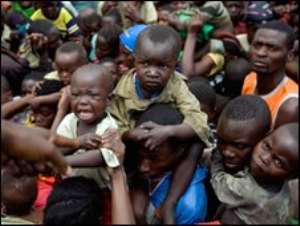
The British and French foreign ministers have said urgent action is needed to ease the current crisis in the Democratic Republic of Congo.
David Miliband and Bernard Kouchner warned that displaced people needed rapid humanitarian aid and urged the full implementation of peace deals.
Meanwhile, the UN is to send a convoy of food and medical supplies to help 250,000 people displaced by fighting.
It will leave the city of Goma and move into rebel-controlled territory.
Forces loyal to renegade Gen Laurent Nkunda have routed the Congolese military in the areas around Goma and now control vast swathes of the North Kivu region.
Mr Miliband and Mr Kouchner met Rwandan President Paul Kagame in Kigali after visiting camps for displaced people around Goma and holding talks with Congolese President Joseph Kabila in Kinshasa.
The Congolese government accuses Rwanda of backing the rebels, but both country's presidents have agreed to attend a regional summit on the situation in the coming weeks.
In a joint statement, the two European foreign ministers said visiting the area had brought home how necessary it was to end the conflict and improve living conditions for those caught in the middle.
"The immediate needs are obvious. We saw them yesterday," they said.
"The humanitarian needs for food, shelter, water and healthcare must be met through universal provision and secure routes for delivery."
The pair also called for the strengthening of the 17,000-strong UN force in DR Congo, and said bilateral peace agreements already in place between regional powers must be honoured.
UK Prime Minister Gordon Brown has said the international community must "not allow Congo to become another Rwanda", where 800,000 people died in a 1994 genocide that is seen as the origin of the current conflict over the border.
Aid corridor 'vital'
Since fierce fighting began across the eastern DR Congo almost two months ago, some 250,000 people have been forced from their homes, and aid agencies have been forced to suspend operations.
As many as 50,000 displaced have reached Goma while many others have vanished. It is unclear how they are managing to survive.
The British and French foreign ministers said establishing an aid corridor to Goma was a top priority.
Visiting the Kibati camp for displaced people north of Goma on Saturday, the ministers and their bodyguards had to push through dense crowds of desperate people.
Correspondents say many were struggling to cook meagre emergency rations while others tried to put up flimsy plastic shelters in the rain.
Others were trying to return to their homes, journeying on foot through territory now controlled by Gen Nkunda, whose rebels are camped out near the city.
"We received no food, so we are returning," Paul Bashoboye Bareke told the AFP news agency, surrounded by his wife and their eight children.
Others saw no point in going home.
"We want to return to our village, but only if there is security. I have not eaten for six days," one elderly woman, Rgwasa Nyakaruhije, told Reuters.
Concerns were heightened earlier in the week when the UN refugee agency said camps sheltering 50,000 refugees in Rutshuru, 90km (56 miles) north of Goma, had been forcibly emptied, looted and razed.
Overstretched peacekeepers
A senior US official has backed the idea of sending EU troops to help the overstretched UN mission, Monuc.
But Mr Miliband said the 850 UN soldiers in Goma should rather be reinforced by some of the 16,000 peacekeepers deployed in other parts of the country.
The head of Monuc, Alan Doss, said the UN force was "stretched" on four fronts.
Gen Nkunda says he is fighting to protect his Tutsi community from attack by Rwandan Hutu rebels, some of whom are accused of taking part in the genocide.
There have been accusations of collusion between DR Congo's army and Hutu guerrillas, while the Congolese government, for its part, has accused Rwanda of backing Gen Nkunda.
Rwanda denies this, but it has twice invaded its much larger neighbour in recent years.
Source: BBC




 Togo leader Gnassingbe follows father's political playbook
Togo leader Gnassingbe follows father's political playbook
 NDC panics over Bawumia’s visit to Pope Francis
NDC panics over Bawumia’s visit to Pope Francis
 EC blasts Mahama over “false” claims on recruitment of Returning Officers
EC blasts Mahama over “false” claims on recruitment of Returning Officers
 Lands Minister gives ultimatum to Future Global Resources to revamp Prestea/Bogo...
Lands Minister gives ultimatum to Future Global Resources to revamp Prestea/Bogo...
 Wa Naa appeals to Akufo-Addo to audit state lands in Wa
Wa Naa appeals to Akufo-Addo to audit state lands in Wa
 Prof Opoku-Agyemang misunderstood Bawumia’s ‘driver mate’ analogy – Miracles Abo...
Prof Opoku-Agyemang misunderstood Bawumia’s ‘driver mate’ analogy – Miracles Abo...
 EU confident Ghana will not sign Anti-LGBTQI Bill
EU confident Ghana will not sign Anti-LGBTQI Bill
 Suspend implementation of Planting for Food and Jobs for 2024 - Stakeholders
Suspend implementation of Planting for Food and Jobs for 2024 - Stakeholders
 Tema West Municipal Assembly gets Ghana's First Female Aircraft Marshaller as ne...
Tema West Municipal Assembly gets Ghana's First Female Aircraft Marshaller as ne...
 Dumsor is affecting us double, release timetable – Disability Federation to ECG
Dumsor is affecting us double, release timetable – Disability Federation to ECG
